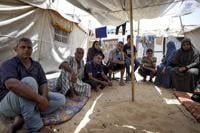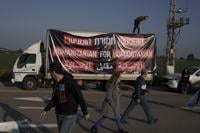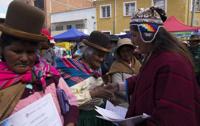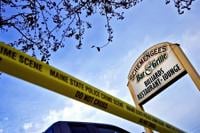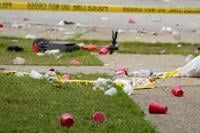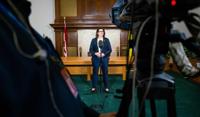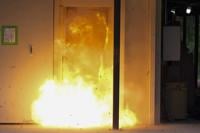MUWASI, Gaza Strip (AP) — On his key chain, Hassan Nofal keeps the keys to two homes. One is to the house of his grandparents in what is now southern Israel, which his family was driven out of by Israeli forces in 1948 and to which they’ve never been able to return.
The other is to Nofal’s house in northern Gaza that he had to flee last year after Israel launched its campaign of bombardment and offensives in the territory.
Over the nearly nine months since, Nofal and his family have been uprooted four times, driven back and forth across the Gaza Strip to escape the onslaught. Nofal said he is determined to make sure his key doesn’t become a keepsake like his grandparents’.
“If my house key becomes just a memory with me moving forward, then I don’t want to live anymore,” he said. “I must return to my house … I want to stay in Gaza and settle in Gaza with my children in our house.”
Israel has said Palestinians will eventually be allowed to go back to their homes in Gaza, but it is not clear when. Many homes have been destroyed or heavily damaged.
triggered by Hamas’ Oct. 7 attack on southern Israel, has driven some 1.9 million of the territory’s prewar population of 2.3 million Palestinians from their homes. Most of them have been uprooted repeatedly since then, fleeing over and over across the length of the strip to escape a series of ground offensives.
Each time has meant a wrenching move to a new location and a series of crowded, temporary shelters — whether at the homes of extended family, U.N. schools, or tent camps. Along the way, families have struggled to stay together and keep a few possessions. In each new site, they must find new sources of food, water and medical treatment.
In the latest exodus, people have been escaping and after Israel ordered evacuations there. Almost all of Gaza’s population is now crammed into an Israeli-declared “humanitarian safe zone” covering about 60 square kilometers (23 square miles) on the Mediterranean coast, centered on a barren rural area called Muwasi.
Despite its name, Israel has Conditions are squalid in sprawling camps of ramshackle tents set up by the displaced — mostly plastic sheeting and blankets propped up on sticks. With no sanitation systems, families live and have little access to drinkable water or humanitarian aid.
Nofal, a 53-year-old employee of the Palestinian Authority, said he, his wife and six children fled their home in the northern refugee camp of Jabaliya in October. First they went to the central town of Deir al-Balah, then to Gaza’s southernmost city Rafah. They had to flee again when Israel launched an offensive there in May and moved to Khan Younis. Last week, they fled Khan Younis to a tent in Muwasi.
“Being displaced to a new place, it’s hard to deal with bugs and living on sandy ground,” he said. “We get sick because it gets hot during the day and slightly cold in the night.”
But the first move, leaving his home in Jabaliya, was the hardest, he said. He held up his key chain with the keys to his home and to his grandparents’ home in what was once the Palestinian village of Hulayqat, just outside what is now Gaza. Nothing remains of Huylaqat -- the precursor to the Israeli military seized the village and nearby ones in early 1948, forcing out inhabitants.
Such old keys are prized possessions for during the conflict that surrounded Israel’s creation. Many in Gaza fear that, as in that past war, they will not be allowed back to their homes after this one.
Ola Nassar also holds onto the keys to her home in the northern Gaza town of Beit Lahiya. For her, they symbolize “safety, stability, freedom. It’s like my identity.”
Her family had just moved into the house with a newly renovated kitchen when the Gaza war began. Now it has been heavily burned, along with clothes and decorations she had to leave behind when they fled in October. She misses a treasured set of plates that was a gift from her brother and shattered during an airstrike.
She, her husband and their three children have been displaced seven times during the war, fleeing from town to town. From Rafah, they came to their current shelter – a tent in Muwasi.
“Every displacement we experienced was hard because it takes time to cope. And by the time we cope we’d have to move again,” she said. Finding food was often difficult because of skyrocketing prices. “There were days we’d eat only one meal,” she said.
As they rushed out of their homes, many left behind almost everything, grabbing only some essentials. Nour Mahdi said she took only her house keys, the deed to her apartment to prove ownership and a photo album of her seven children. The album later got ruined in the rain, so she said she used it as kindling for a fire to cook with.
“This was very hard because it was very important for me as it contained memories involving my children,” she said.
Omar Fayad kept a picture of his daughter and one of himself when he was 10 years old. But after multiple moves — “each place worse than the other" — he wishes he'd never left his home. “It would’ve been better for me if I stayed in my house there and died,” the 57-year-old said, longing for his home in Beit Hanoun in north Gaza.
The Hamas militants that attacked southern Israel on Oct. 7 killed some 1,200 people and took 250 others hostage. Israel’s response has killed more than 38,000 Palestinians, according to the Gaza Health Ministry, which between civilians and combatants in its count.
Muhammed al-Ashqar, also from Beit Lahiya, said he has been displaced six times with his four daughters, four sons and his grandchildren.
Along the way, the family got separated. Al-Ashqar’s brother stayed in the north because his wife was pregnant and not healthy enough to move. Soon after, shrapnel from an airstrike hit her in the head and killed her, but the baby was saved.
One of al-Ashqar’s sons went to the Nuseirat refugee camp in central Gaza to stay in his wife’s family home. The son was in the kitchen cooking one day when an airstrike hit the home, killing his wife and four of his children in the living room. The son’s leg was amputated, and two of his surviving children now live with al-Ashqar. Another son was killed in a separate strike in Nuseirat.
After all that, it is not possessions that the 63-year-old misses.
“There is nothing to cry over after leaving everything behind and seeing all these dead people and all this suffering.”
—�Ĕ
Khaled reported from Cairo. Associated Press correspondent Wafaa Shurafa in Muwasi, Gaza Strip, contributed to this report.
___
Follow AP's Gaza coverage at


